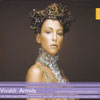Vivaldi Armida al campo d'Egitto
A persuasive performance and a sensitive reconstruction
View record and artist detailsRecord and Artist Details
Composer or Director: Antonio Vivaldi
Genre:
Opera
Label: Naïve
Magazine Review Date: 13/2010
Media Format: CD or Download
Media Runtime: 0
Mastering:
Stereo
DDD
Catalogue Number: OP30492

Tracks:
| Composition | Artist Credit |
|---|---|
| Armida al campo d'Egitto |
Antonio Vivaldi, Composer
Antonio Vivaldi, Composer Concerto Italiano Gérard Depardieu, Narrator Rinaldo Alessandrini, Conductor |
Author: David Vickers
Naïve’s latest operatic instalment in its epic Vivaldi Edition offers plenty of musical details to admire. The recitatives during the opening scene are sterile, without sufficient sense of dramatic occasion, but subsequently the singers usually characterise their parts neatly. Raffaella Milanesi, Marina Comparato and Romina Basso are all on fine form as the disputing participants in a complex network of quarrelling lovers. Alessandrini’s shapely and sensitive direction gets the best out of Monica Bacelli and Martín Oro; some of the latter’s technical frailties are exposed in Tisaferno’s pathetic “Quando in seno”. Surprisingly Furio Zanasi lacks the authoritative presence that the Egyptian Caliph ought to possess but duets shrewdly with a bassoon in “Chi alla colpa fa tragitto”. Sara Mingardo seems to relish the machinations and flirtations of the title-role; her Act 3 showpiece “Tender lacci tù volesti” is the only aria to feature horns. Almost all other music is scored simply for strings and continuo but within such economical instrumental parameters Vivaldi creates delightful and versatile accompaniments: Tisaferno’s “D’un bel volto arde alla face” features the delicate sonority of a lightly tripping bass part (harpsichord, violins and violas) over which obbligato violin and cello alternate graceful arpeggios; creeping strings gently convey Emireno’s hopefulness that his unrequited love will change but also hint that he entertains little real optimism (“Il mio fedele amor”); Armida’s jaunty “Tra l’oscura di nimbi e procelle” juxtaposes concertino and ripienists; divided violas provide a denser tempestuous texture for Adrasto’s “Agitata de venti dall’onte”.
Alessandrini’s direction is unfailingly astute and he conveys playfulness in elegant ways. Concerto Italiano’s violinists play with alert finesse. Armida does not seem to be one of Vivaldi’s most impressive works, notwithstanding a compelling final act, but it receives one of the most convincing performances of Naïve’s series so far.
Discover the world's largest classical music catalogue with Presto Music.

Gramophone Digital Club
- Digital Edition
- Digital Archive
- Reviews Database
- Full website access
From £8.75 / month
Subscribe
Gramophone Full Club
- Print Edition
- Digital Edition
- Digital Archive
- Reviews Database
- Full website access
From £11.00 / month
Subscribe
If you are a library, university or other organisation that would be interested in an institutional subscription to Gramophone please click here for further information.




